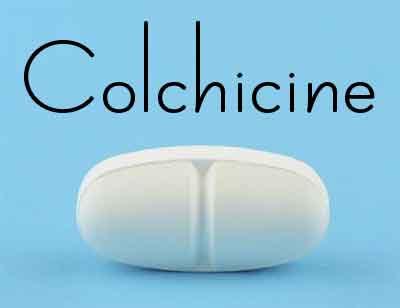- Home
- Editorial
- News
- Practice Guidelines
- Anesthesiology Guidelines
- Cancer Guidelines
- Cardiac Sciences Guidelines
- Critical Care Guidelines
- Dentistry Guidelines
- Dermatology Guidelines
- Diabetes and Endo Guidelines
- Diagnostics Guidelines
- ENT Guidelines
- Featured Practice Guidelines
- Gastroenterology Guidelines
- Geriatrics Guidelines
- Medicine Guidelines
- Nephrology Guidelines
- Neurosciences Guidelines
- Obs and Gynae Guidelines
- Ophthalmology Guidelines
- Orthopaedics Guidelines
- Paediatrics Guidelines
- Psychiatry Guidelines
- Pulmonology Guidelines
- Radiology Guidelines
- Surgery Guidelines
- Urology Guidelines
Gout drug may reduce blood sugar and prevent metabolic syndrome related diabetes

Gout drug Colchicine may reduce blood sugar and help prevent metabolic syndrome related type 2 diabetes, suggests a new study.
According to researchers at the National Institutes of Health, Gout drug colchicine could potentially reduce complications accompanying metabolic syndrome, a combination of high blood pressure, high blood sugar and other conditions that increase the risk of heart disease and type 2 diabetes. The new study appears in Diabetes, Endocrinology, and Metabolism.
Metabolic syndrome is a cluster of conditions that occur together, increasing your risk of heart disease, stroke and type 2 diabetes. These conditions include increased blood pressure, high blood sugar, excess body fat around the waist, and abnormal cholesterol or triglyceride levels.
Mostof the disorders associated with metabolic syndrome don't have obvious signs or symptoms. One sign that is visible is a large waist circumference. And if your blood sugar is high, you might notice the signs and symptoms of diabetes — such as increased thirst and urination, fatigue, and blurred vision.
Colchicine is an alkaloid obtained from the plant colchicum autumnale.
The drug colchicine, is used to treat the arthritic condition gout and gout flares.Historical use of colchicine, or its precursors, dates back several thousand years, with reports appearing in records from ancient Egyptians, Greeks and Arabic physicians. Although colchicine has been used for centuries, formal FDA approval of the medication did not occur until 2009, which resulted in colchicine being considered a “new” drug and moving from an inexpensive generic drug to a much more expensive, branded drug with marketing exclusivity for 3 years.
Previous studies have indicated that the system-wide inflammation that occurs in obesity plays a role in the development of type 2 diabetes. In the current study, researchers led by Jack A. Yanovski, M.D., Ph.D., of NIH's Eunice Kennedy Shriver National Institute of Child Health and Human Development (NICHD) randomly assigned 21 study participants to received colchicine twice a day for 3 months, while 19 participants received a placebo. Colchicine suppresses a multi-protein complex called NLRP3, which triggers the inflammation seen in obesity.
Researchers looked at several measures that reflect how well insulin works in the body to clear sugar from the blood (insulin resistance). There was no difference between the two groups in insulin resistance determined by one measure of insulin use (the frequently sampled, insulin-modified intravenous glucose tolerance test). However, the colchicine group showed improvement on the Homeostatic Model Assessment of Insulin Resistance test, which also estimates how much insulin is needed to keep blood sugar at a normal level while fasting. Those in the colchicine group also scored lower on a blood test of C-reactive protein and other tests that indicate inflammation. The authors concluded that larger studies are needed to determine if colchicine could prevent the development of type 2 diabetes in people with metabolic syndrome.
blood sugarblood sugar levelsColchicinediabetesDrugfewer high densityGoutHeart diseasehigh blood pressurehigh blood sugarJournal Diabetes Endocrinology and Metabolismmetabolic syndromenew studyObesitypreventrelatedType-2 diabetes
Next Story
NO DATA FOUND

Disclaimer: This site is primarily intended for healthcare professionals. Any content/information on this website does not replace the advice of medical and/or health professionals and should not be construed as medical/diagnostic advice/endorsement or prescription. Use of this site is subject to our terms of use, privacy policy, advertisement policy. © 2020 Minerva Medical Treatment Pvt Ltd